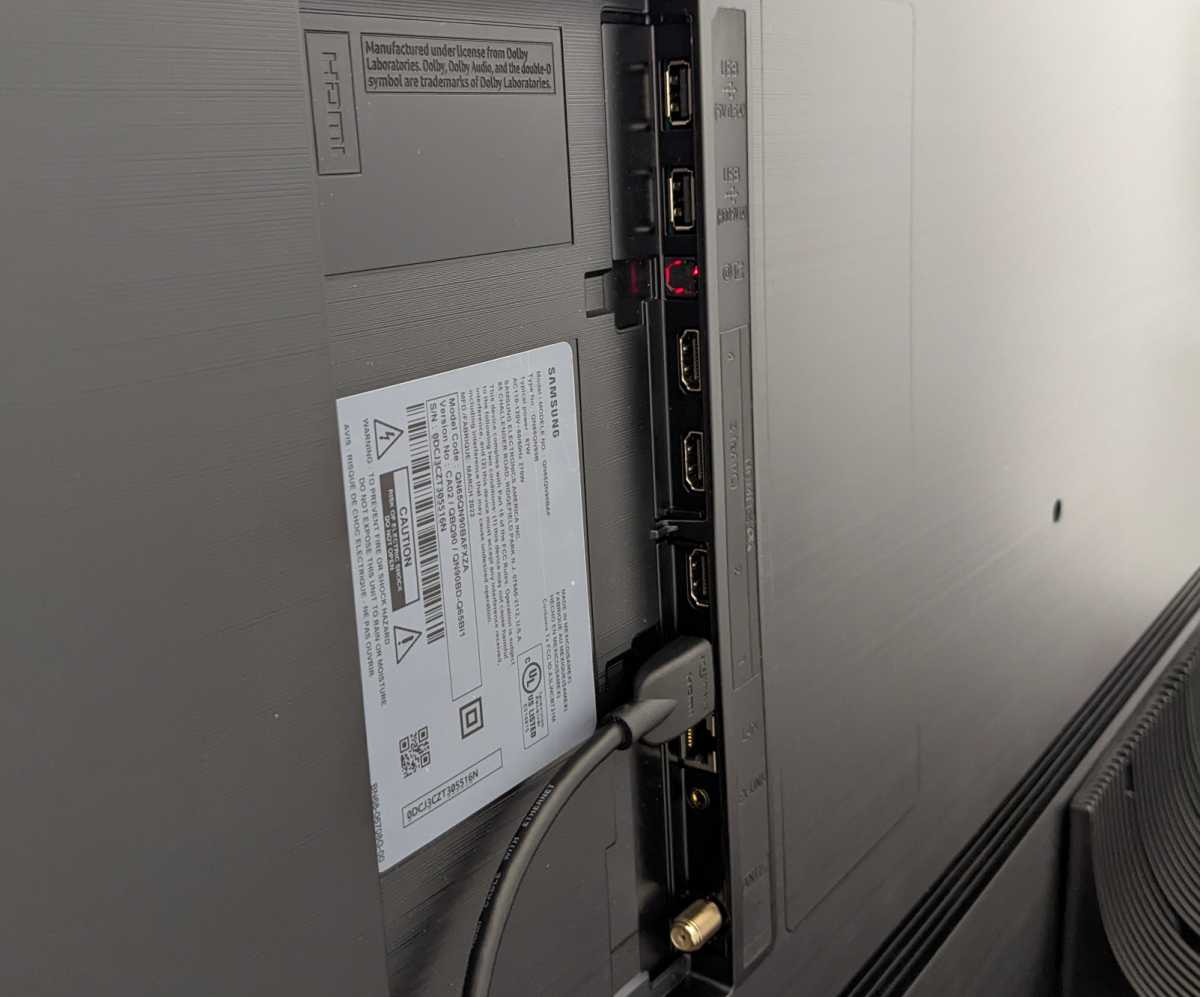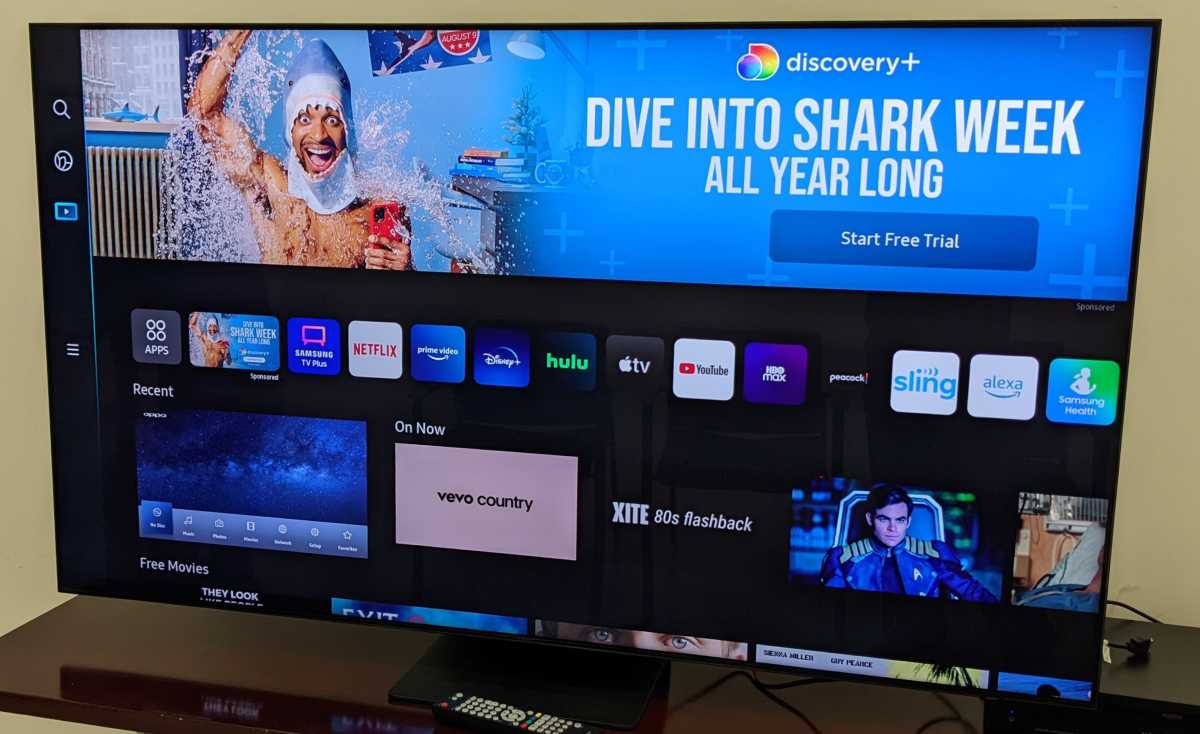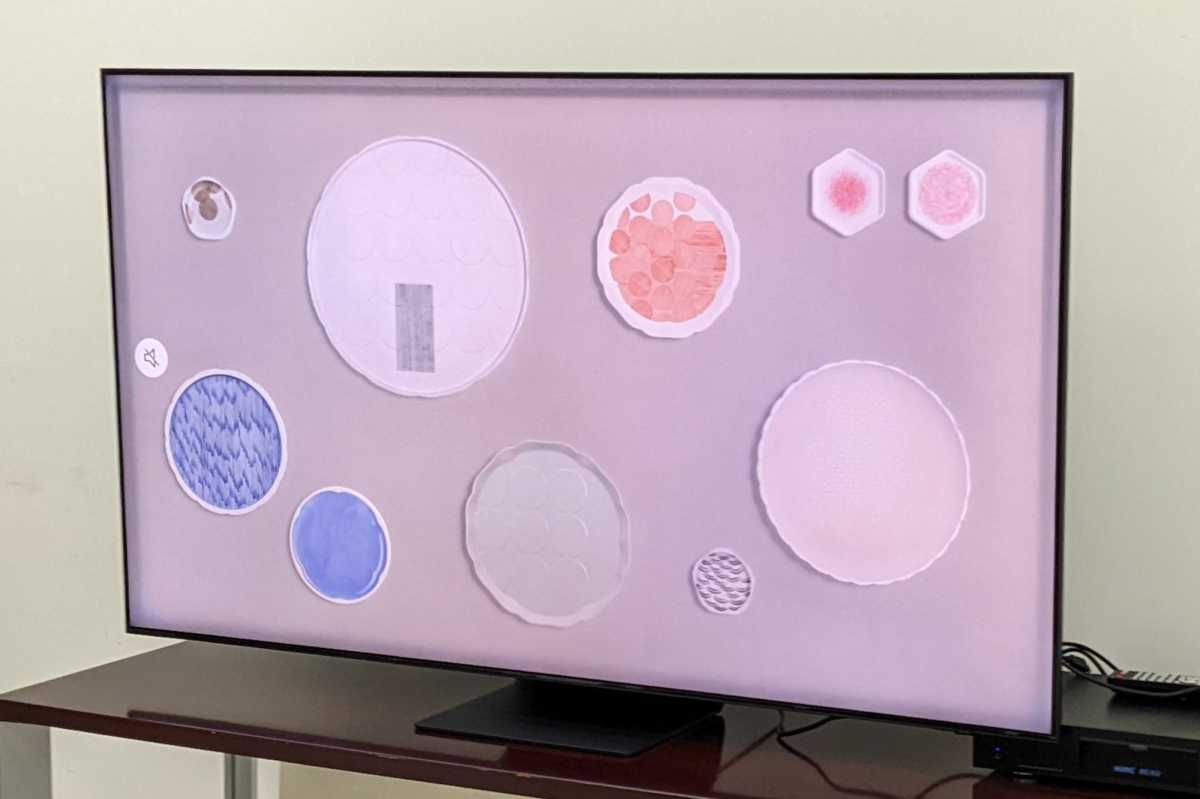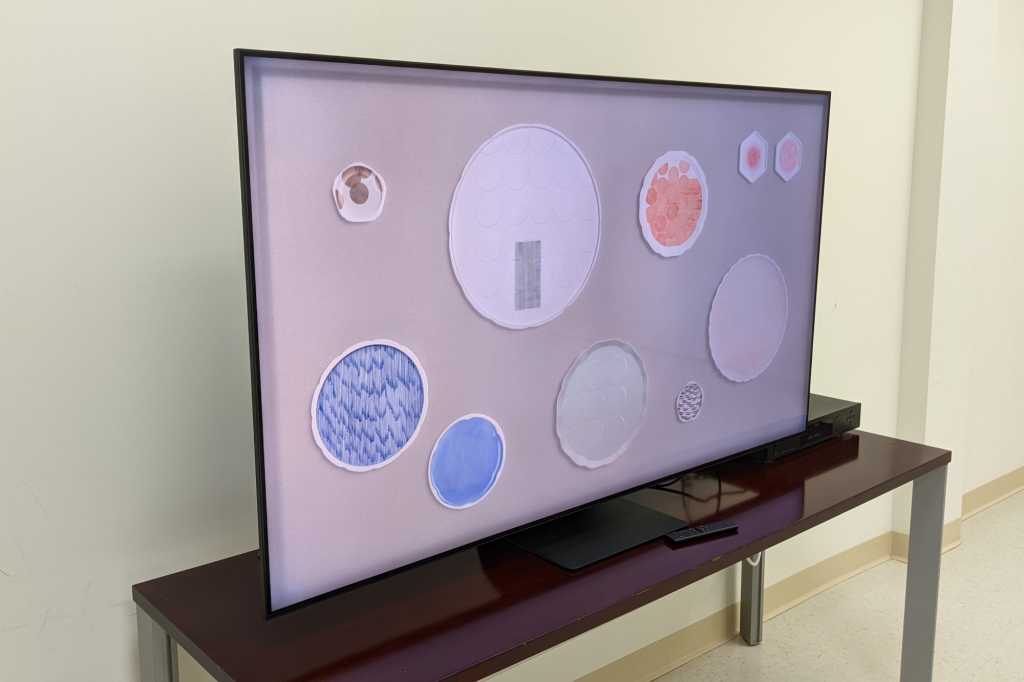Expert’s Rating
Pros
- Great picture and HDR
- All 120Hz HDMI ports
- Excellent color acuity and saturation
- New RF-harvesting solar remote
Cons
- Pricey
- Doesn’t support Dolby Vision
- Interface requires too many clicks to get anywhere
Our Verdict
Samsung’s best 4K UHD LCD TV offers a teriffic HDR image, along with top-of-the-line HDMI ports and a remote that can be charged via RF harvesting, but the convoluted interface demands too many clicks.
Price When Reviewed
$2,599.99 (65-inch)
Best Prices Today: Samsung QN90B Neo QLED 4K Smart TV

$1,197.99
Free
The 2022 QN90B is the follow-on, and a slight improvement to, Samsung’s 2021 marriage of mini-LED backlighting and quantum dot color, a.k.a. Neo QLED. The color is fantastic, and loads of peak brightness deliver some of the most impactful HDR you’ll see in the industry–perhaps not as many nits as Samsung has led people to believe, but still a boatload of it.
Samsung QN90B features, price, and design
I tested the $2,700, 65-inch version of the QN90B, but the set is also available in 43-inch ($1,200), 55-inch ($1,700), 75-inch ($3,000), 85-inch ($4,500), and even 98-inch ($15,000) flavors.
This review is part of TechHive’s coverage of the best smart TVs, where you’ll find reviews of the competition’s offerings, plus a buyer’s guide to the features you should consider when shopping for this type of product.
The QN90B is a 4K UHD (3840 by 2160) quantum-dot TV using FALD (Full Array Local Dimming) mini-LED backlighting. Local dimming means parts (zones) of the array can be dimmed to create darker blacks. The QN90B features a couple hundred of these zones, and while they do make for darker blacks where zones are dimmed, they can also cause minor artifacts (such as blooming) with certain material.
The 65-inch class (64.5 inches diagonally) QN90B weighs in at nearly 54 pounds, not including the 15-pound pedestal stand.
The ports are located on the back and consist of four HDMI (all 120Hz, including one with eARC, an improvement over 2021), two USB 2.0 ports, coax, ethernet, RS-232c (EX-LINK), and optical audio out. Wireless connectivity comes in the form of 802.11ac Wi-Fi (or Wi-Fi 5) and Bluetooth 5.2, including support for low-latency Bluetooth headsets (a feature that not all TVs share).

As you can see from the photos, the QN90B has a thin black bezel, giving it an attractive profile whether the TV is sitting on a cabinet or hanging on the wall. The set itself is only an inch thick, and it comes with a 400 x 300mm VESA mount point.
As one of Samsung’s top-of-the-line Neo QLEDs, the QN90B gets all the technological bells and whistles, including support for all Dolby audio formats; HDR10, HDR10+, and HLG high dynamic range content (as usual, Samsung’s doesn’t support Dolby Vision); built-in voice assistants, including Alexa, Google Assistant, and Samsung’s Bixby; FreeSync Premium, auto low latency, and variable refresh rate for gaming; and (as previously mentioned) Bluetooth peripheral and headset support.
Also on hand are Samsung’s own proprietary features, such as Ambient mode (or wallpaper that matches the TV’s surroundings), auto sound adjustment, and support for the company’s 360-degree cameras. A convenient content/channel guide is also provided.
Samsung QN90B interface and remote
Samsung has “improved” its Smart Hub interface with the addition of a navigation bar to the right and pop-up bars on the bottom that replace the former small contextual menus for the main row of apps and inputs. There are now “hubs”: Media (movies, TV shows, and so on), Ambient (wallpapers, artwork), and soon a Game hub. The various bars and hubs make for easier navigation, but they also take up a lot of screen real estate.
Overall, Samsung’s Smart Hub remains perfectly usable, but it’s dropped to my least favorite TV interface, a spot long occupied by Android/Chrome TV (which now seems like a paragon of efficiency in comparison). By nesting its many functions too deeply, Smart Hub requires too many clicks to accomplish anything.

Also contributing to the high click count is Samsung’s minimalism when it comes to remote buttons. Samsung’s remotes are actually my favorites in terms of look and feel, and I like that you can charge the QN90B’s remote using either light (there’s a solar cell on the back), the USB-C port, or via RF harvesting, a nifty new feature that turns nearby radio waves into energy. I also love the combo volume/mute and channel/guide lever buttons.
That said, the lack of dedicated transport, settings, and input buttons has bugged me since day one. Instead, you get the shortcut/advertising buttons (for Netflix, Amazon Prime Video, and so on) that may or may not be useful to you. Most TV remotes now (sadly) have these shortcut buttons, but with so few other buttons on the Samsung remote, their inclusion here really sticks out.
Back on the plus side, the voice control works well, there’s a large selection of available smart TV apps, nicely presented content, and–as previously mentioned–a useful channel/content guide.
Samsung QN90B performance
Any TV using quantum dots is going to deliver accurate, well saturated color, and the QN90B is no exception. There’s also a ton of peak brightness for rousing HDR, an eye-popping benefit of the mini-LED backlighting (Neo QLED) that Samsung switched to last year.
The vast majority of the time said backlighting delivers excellent contrast and black levels (for an LCD TV, anyway). For some reason, however, the company chose a less granular array grid for its mini-LED implementation than, say, TCL. Zones number in the hundreds rather than thousands the company’s Chinese rival uses in its 8-series.
Hence, while the QN90B’s rendering of the Spears & Munsil moving starfield didn’t suffer the gaseous cloud effect we saw with the QN900B, neither did it match dark space behind the stars we saw from the TCL 8-series. To be honest, I thought multiplying the zone count would be in the offing for 2022, but Samsung has stuck with its older implementation.

Beyond tough (for backlit TVs) tests like starfields, the QN90B did wonderfully. Motion compensation is smooth, screen uniformity is top notch, the viewing angles are very wide, and real world material (OTA, 1080p/2160p movies, etc.) generally looks fantastic.
Samsung’s thing is bright detail, which makes for dramatic images, but does tend the exhibit more shimmer and moire when detailed backgrounds are scrolled than TVs that default to less detail. Indeed, dialing back the sharpness, contrast and other related settings will almost eliminate these phenomena. Crank them back up for HDR.
Summing it up, while QN90B would do even better with more zones, it still offers one of the best 4K UHD LCD pictures on the market. And we’re aware of none that offer a better HDR experience.
Samsung QN90B Neo QLED 4K TV: Is it worth the cash?
Quantum dot color, along with the killer peak brightness, makes the Samsung QN90B a great 4K UHD TV for HDR. But it’s also pricey, and there are excellent TVs from TCL, Hisense, and others with better interfaces for considerably less.
Value propositions aside, the Samsung QN90B is among the best-looking 4K LCD TV currently on the market, and hence it earns our Editors’ Choice. But if you’re spending this much cash on a TV, you should perhaps consider upping the ante a few hundred for what is currently the ultimate in 4K picture quality: Samsung’s own S95B, a vibrant, game-changing OLED TV that combines OLED technology with quantum dots.
Editor’s note: As noted in the intro, Samsung has been accused of rigging its displays so that they perform differently during benchmarking than they do during normal use. We have our own opinions about the Samsung benchmarking brouhaha, but generally speaking, we base our opinions on what we observe in real world material. We do test, of course, but our eyes and experience call the shots in our reviews and ratings.

